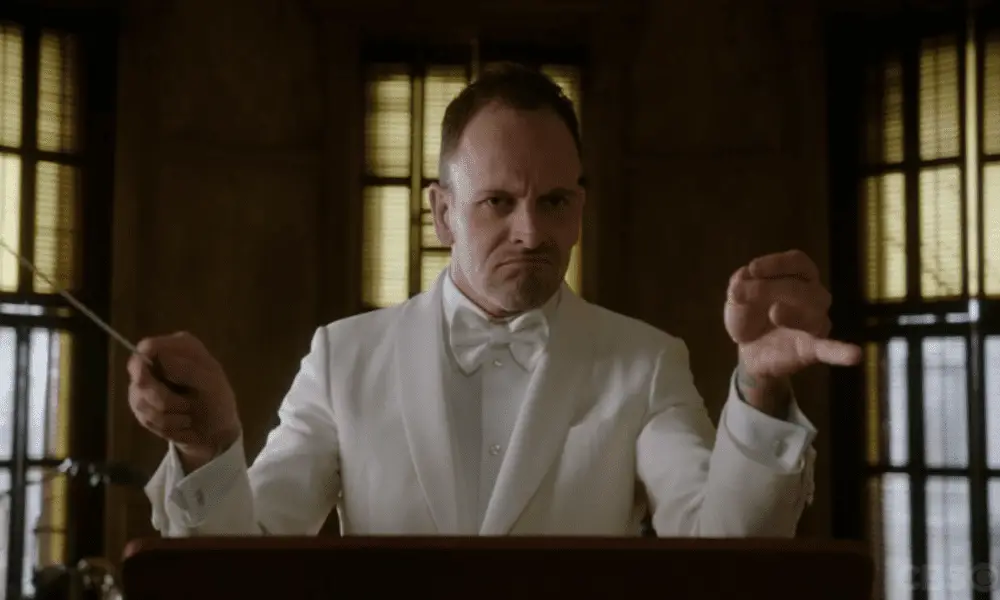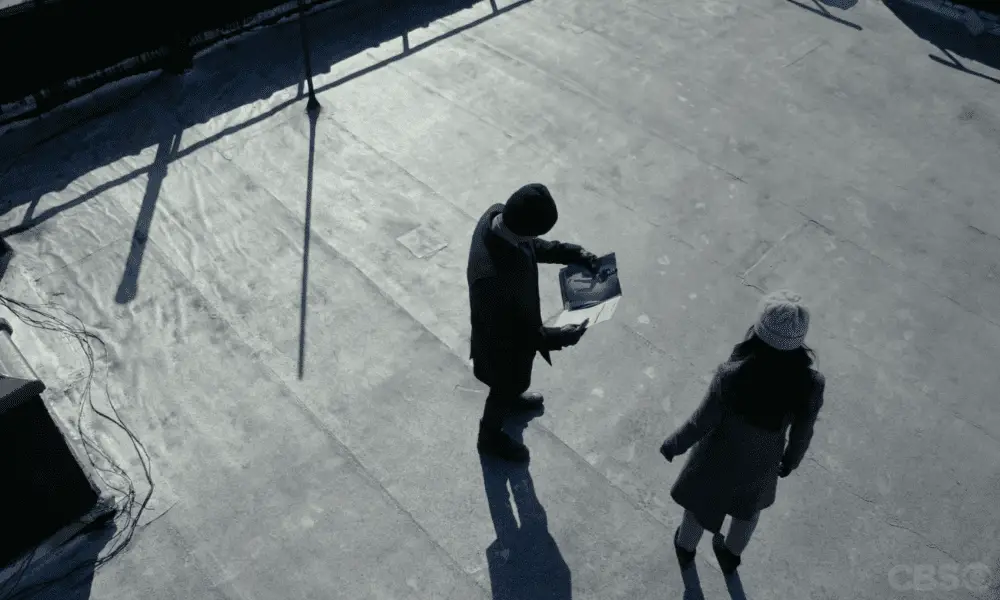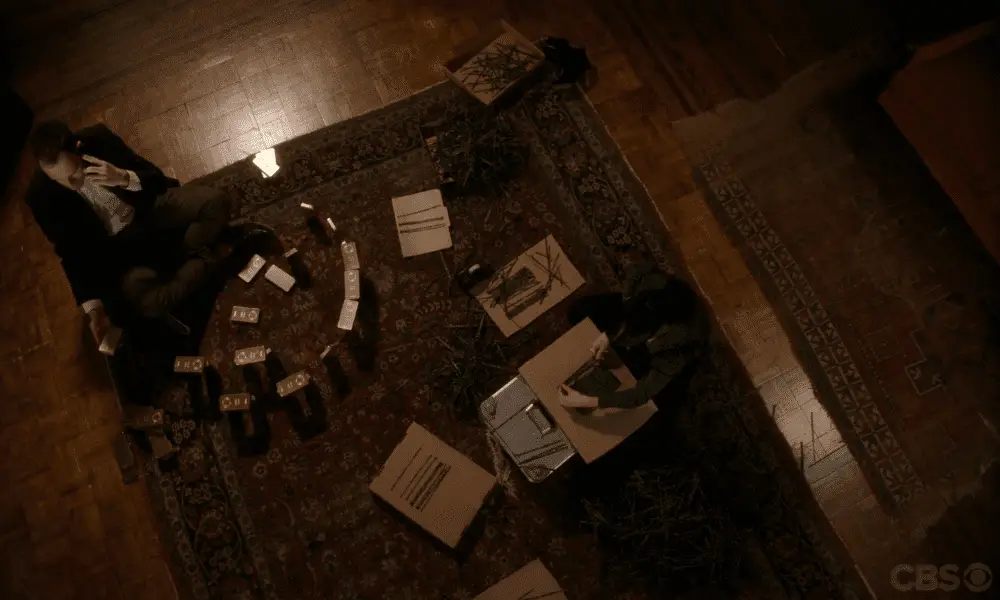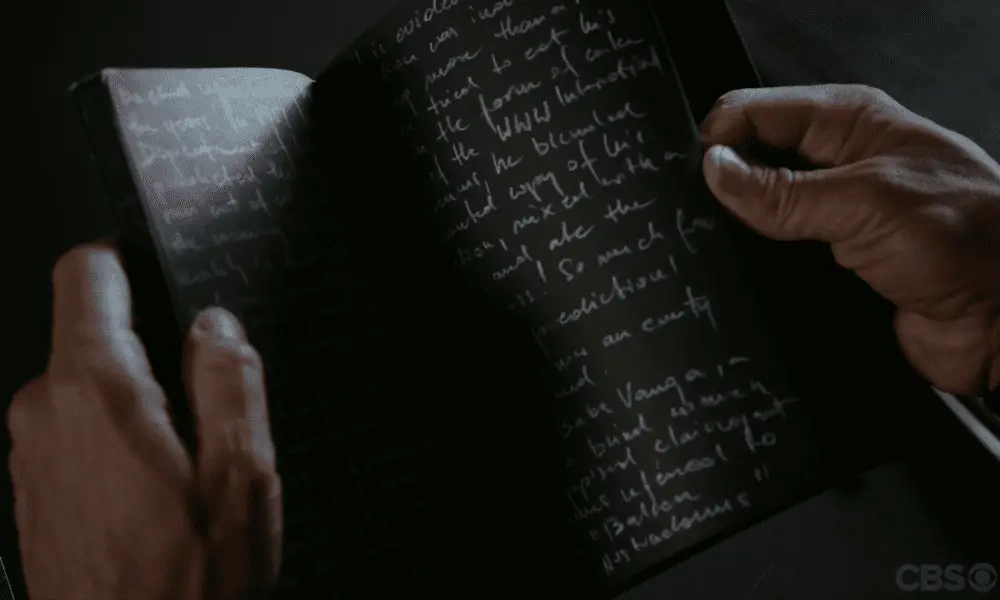Content warning: this review discusses suicide, as depicted on the show.
I have a theory: the Elementary costume crew wanted an excuse to put Sherlock in white tie. That’s the best explanation I have for why Sherlock spends the first quarter of this show in exactly that. But don’t get me wrong, he looked good, and I loved it.
In-show, the explanation is that Joan and Sherlock intend to attend some sort of symphonic audition in order to steal back a stolen flute for a client. But as Sherlock is practicing conducting alone in the Brownstone, the doorbell rings. A man has come with a most unusual case.
The client is David Horowitz. His brother Norman recently died of an accidental overdose. But that’s not the case. Norman had schizophrenia. He wrote obituaries for a newspaper and had developed the odd hobby of writing obits for people who hadn’t actually died yet, including cause of death. Since his death, three of his obituaries have come true, both in date and manner of death. Sherlock is skeptical but intrigued and agrees to investigate.
Except that’s still not the case. David didn’t come here to hire Sherlock at all. He came to warn him. One of the obituaries was about Sherlock himself. According to Norman, Sherlock is going to be shot and killed in the next few days. So that’s…exciting.
Sherlock skips the symphony audition and instead heads to the Horowitz home, where David, his wife Luz, and Norman all lived. Joan comes too, stolen flute safely in hand. Either Norman could literally see the future, or someone is killing the people from Norman’s obituaries in order to make his predictions come true. But why?
Norman was a smart guy who was fascinated by science fiction. He turned to that genre to try and explain his world and his schizophrenia. He believed in something called simulation theory, the idea that reality is actually a massive computer simulation. Some people, or so Norman thought, were programmed with special, prophetic abilities.

Nor was Norman the only one to believe in simulation theory. Others on the internet shared his ideas and Norman often went to symposium and conventions about the idea. There, he met someone with a familiar name to Joan and Sherlock: Henry Baskerville, the star of Elementary’s robotic Hounds of the Baskerville-themed episode.
Next stop is Baskerville himself. He wasn’t friends with Norman, but they had met once at a symposium. Baskerville believes in the theory and wields some influence among other believers. Norman may have known Sherlock’s name in the first place due to his connection to Baskerville.
Sherlock thinks that the person killing off the subjects of the obits is doing so not just to prove Norman’s prophetic abilities but also prove simulation theory true. Baskerville provides a list of people he’s encountered that are overly zealous about simulation theory. But he also provides a different theory: maybe Norman really was a prophet.
Back at the brownstone, Joan proposes that Sherlock lay low as she and Bell try to solve one of the deaths from the three “true” obituaries. If they solve one, they should solve them all. Sherlock agrees but also has another thing he’d like to discuss with Joan. His last will and testament, in case someone does gun him down in the next few days.
No surprise, he’s leaving everything to Joan, the house and his trust from his father. He gives her access to the bank accounts in order to look things over, but when she does, she finds something surprising. Which is to say, she doesn’t find much at all. Sherlock’s accounts have been drained. Oddly, Sherlock doesn’t seem very surprised. He knows who robbed him.
The last of the three people whose obituaries have come true is a local woman named Christina Dawson. She apparently killed herself by jumping off her apartment building. Her husband, who was out of town that night, was completely taken by surprise. She didn’t leave a note. When Joan and Bell check out the scene on the rooftop, they notice a neighboring building has security cameras. The whole thing should be on tape.
The detectives are expecting to see that Christina was pushed or otherwise forced to jump off the building. Yet, as they watch, they see that Christina is alone on the rooftop and she jumps off apparently of her own free will. The more they investigate, the more the other two deaths seem normal too. (If you haven’t watched the episode yet and you’re sensitive to depictions of suicide, please be aware that they play the tape of Christina Dawson’s death several times.)

The case is getting weirder all the time when someone leaks the story to the press. Channel 10 breaks the story and posts a bunch of the obits online. Never mind that if someone is killing over the obits, that’s exactly what they would want! But several of the names reported by Channel 10 are different from the names David gave Joan and Sherlock. So how did Channel 10 get their hands on them? Did Norman have a friend or perhaps co-conspirator with his hands on the obits? It seems likely that the leaker is also the killer and is drawing attention to the deaths in order to validate Norman’s “prophetic” abilities.
Sherlock meets with the reporter from Channel 10 in an attempt to wheedle her source out of her. A journalist, of course, should never give up a source. But Sherlock offers to give the reporter the full story of the case in exchange. She’s an ambitious woman. She can’t resist.
But unfortunately, the tip came in anonymously from someone using a burner phone. The tipster told the station where to find the obituaries online. That means they were out there, on the internet. Interesting.
The obituaries were posted on an obscure simulation theory chatroom. Someone with the username “WokeBaeBae” (yeurgh) randomly shared them. No one in the chatroom knew who that user was, but the chatroom moderator should have the person’s IP address. In fact, considering the moderator is a passionate believer both in simulation theory and in Norman, Bell wonders if he isn’t WokeBaeBae himself and perhaps the killer.
As Bell tries to track down the chatroom mod, Joan and Sherlock work from home. An odd delivery arrives in the form of several uniformed men with heavy containers. Sherlock opens them to reveal bars of pure gold. Oh. Okay.

It’s his stolen money. His father’s estate manager was the thief. What a shock, that an employee of Morland was unethical! Some mild threats from Sherlock persuaded him to return the money, and he chose to return it in the form of pure gold.
No sooner does this happen than Baskerville suddenly shows up too. He’s like “oh cool, gold.” Rich people are just like that, I guess. Someone anonymously called Baskerville to tell him to check out the Channel 10 report. It’s the same number as the person who leaked to the channel in the first place. Baskerville is increasingly convinced that Norman really was a prophet. Joan receives a text from Bell that they’ve found the chatroom moderator, one Terry Weaver. Baskerville, excited, tells them that’s one of the names on his list of weirdoes in the world of sim theory. He’s also the subject of one of Norman’s obituaries. Dun dun dun.
By the way, that all happened in one very busy scene.
The police show up at Weaver’s house just in time to save him from hanging himself. Not out of any overwhelming sense of guilt, but because he was afraid of the violent death that Norman predicted for him. Weaver knew Norman before his death and is an ardent believer in his abilities. But he denies taking any steps to make Norman’s prophecies come true. Nor does he have the IP of WokeBaeBae. They used technology to disguise it.
However, Weaver has one interesting piece of information. Norman was writing a book of predictions. It was all handwritten on black paper with white ink (hashtag dramatique). He wouldn’t let anyone read this book other than an unnamed editor. They seem like a person worth checking out.
It’s now getting pretty close to the time of Sherlock’s predicted death, so just in case, they send him home with police protection. Joan returns to the Horowitz home to try and find Norman’s book. His brother and sister-in-law say they don’t know anything about it, but Joan finds black paper in Norman’s shredder.

She brings it back to the brownstone to try and reconstruct some of the pages and perhaps find clues. Sherlock struggles with what to do with his literal gold bars. Mo’ money mo’ problems, right? Joan is able to recreate one page from Norman’s book and triumphantly announces that all of the predictions on it are wrong.
An odd call comes in from Bell. Someone pulled the fire alarm at Grand Central Station, creating a panic. But why do Joan and Sherlock care about that? Well, the man who pulled the alarm worked for Henry Baskerville and did it under orders.
Our dynamic duo would naturally like to know why Baskerville would do such a thing. He thinks he has a great reason. He was preventing a terrorist attack, as predicted by Norman, whom Baskerville now sincerely believes in. Baskerville knows of this prediction, because he has Norman’s book. He bought it for four million (four million!) off…the killer, whose identity I shall not reveal!
But as always, knowing the killer’s identity doesn’t mean catching them. Luckily, Sherlock, and you may not know this about him, is extremely observant. It involves a ship, Colombian plants, and a drug that I’m pretty sure doesn’t work the way the writers think it works, but the police catch the killers in the end.
Spoiler alert, it turns out that Norman was not really a prophet.
There’s still the question of Sherlock’s money. He’s reached an unexpected conclusion. He’s no longer willing it to Joan. Or to anyone. Seeing it in gold bars like that made him realize how much he has and how stained it is with his father’s unethical actions. So he gave it all away to Joan’s favorite charities. As a bleeding-heart liberal, I approve. As an underemployed Millenial, I broke into a cold sweat.

Thoughts:
- Considering last episode ended with the dramatic reveal that Michael is back, it’s a bit of a letdown that he isn’t even mentioned in this episode.
- Sometimes Elementary is sympathetic to the topic of schizophrenia…and sometimes not. This episode was a “not” in my opinion. Did they really have to keep calling Norman crazy?
- I am pretty ignorant about music so I could be wrong, but was it just me or did the background music sound weird and different this episode? Not that it was bad! It definitely went along with the reality-bending plotline.
- The whole subplot about Sherlock’s money felt disconnected from the rest of the plot. They didn’t even introduce it till like ten minutes in. Also, in theory, giving away that much money is wonderful. In practice, Sherlock spends a lot of money. He’s casually thrown down a cool mil or more to help solve a case before. Doesn’t he pay Joan’s salary? Does the brownstone have a mortgage? Are they going to be okay?? Did anyone think this through????

